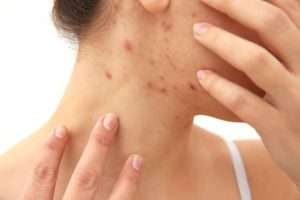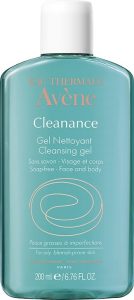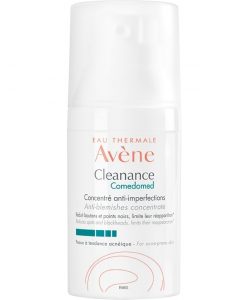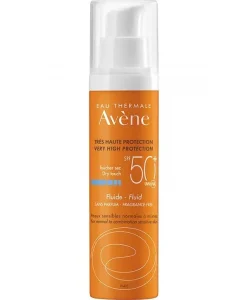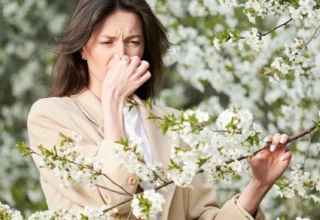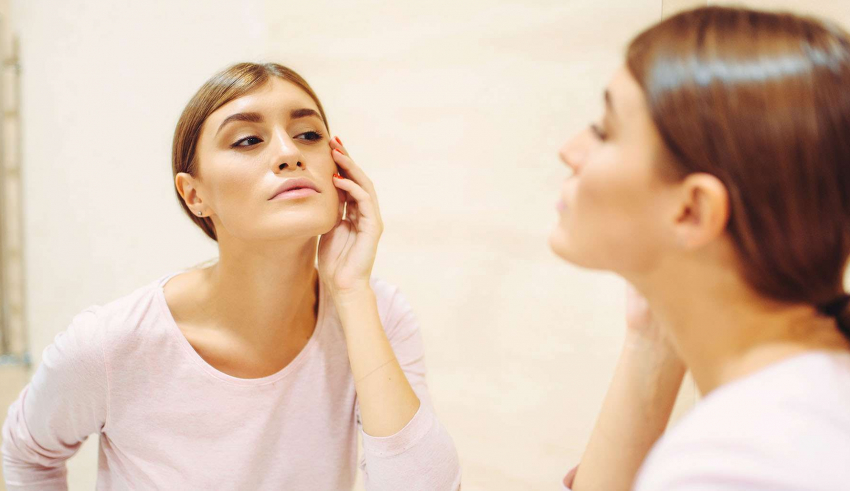
Mirror, mirror on the wall, how can I get rid of acne once and for all?
Nothing can get under your skin more than inflamed acne. Swelling, pain, redness, discomfort, distress… You’ve been through it all, and nothing seems to keep these pimples from twinkling! Are you wondering how to get rid of inflamed acne and calm down the irritation? You’re on the right page. The Dermo Lab will reveal everything you need to know about this skin condition. So, read on and take notes!
What are the differences between the types of acne?
There are different types of blemishes that develop with non-inflammatory and inflammatory acne.
1- Types of non-inflammatory acne
The two main types of non-inflammatory blemishes are blackheads and whiteheads. These types of non-inflammatory acne are known as comedones.
Comedones are either closed or open. A whitehead is a closed comedo because dead skin cells and oil fill the pore to the point that the pore opening closes, usually causing a white-looking lesion to spread from the skin.
A blackhead is an open comedo because, although dead skin cells and sebum fill the pore, the pore opening remains open. As a result, the sebum and dead skin cells are exposed to the air and oxidized, resulting in a blackish appearance.
2- Types of Inflammatory Acne
The most common types of inflammatory acne are:
- Papules: Formerly comedones that turn into small, inflamed bumps that look red or pink.
- Pustules: Bumps that are similar to papules, but larger and contain pus.
- Nodules: Solid bumps that appear below the surface of the skin.
- Cysts: A severe type of inflammatory acne where large fluid-filled bumps often appear deep under the skin.
What Causes Inflamed Acne?
If you want to handle inflamed acne effectively, you must first get to know the causes behind it.
According to Dr. Lama Costantine, there are four main factors that can cause inflamed acne:
1- Increased Oil Production: Overproduction of oil and sebum, especially on your forehead, chest, upper back, and shoulders, where sebaceous glands are the most prominent.
2- Clogged Hair Follicles: The dermis (the inner layer of the skin) contains blood vessels and sebaceous glands, as well as hair follicles which can be clogged by excessive oil and dead skin cells.
3- Propionibacterium Acnes: Clogged pores by excess sebum make for a good environment where Propionibacterium acnes can grow and multiply, which can directly contribute to severe acne inflammation.
4- High Levels of Androgens: Increased androgen production stimulates the sebum production which might lead to clogged pores and red and swollen pimples.
What are the symptoms of inflammatory acne?
Inflamed acne can cause a variety of symptoms. You may notice small papules or pustules developing on certain parts of your face, or severe, persistent outbreaks of cystic acne that can be difficult to treat.
Common symptoms of inflamed acne include:
- Red, swollen acne lesions
- Tenderness, pain and discomfort
- Lesions containing fluid and/or pus
When inflamed acne is severe, it can also cause psychological symptoms, such as depression and/or low self-esteem.
Inflamed acne can also cause scarring and dark spots that can affect the appearance of your skin after your acne flare-ups disappear.
Simple Steps to Treat Inflamed Acne
After looking at the causes behind inflamed acne, you’re only 3 steps away from getting rid of this frustrating condition:
1- Use a Cleanser for Oily Skin: Reducing excess oil and sebum production is the first crucial step. Opt for a face wash designed for oily skin. Its formula clears your clogged pores and deeply cleanses your face.
2- Apply Sunscreen and Sebum-Reducing Products: Sun rays are a main culprit when it comes to increasing acne inflammation! So, always make sure to apply a sunscreen specifically designed for acne-prone skin before going out. You can also rely on cleansers, masks and daily creams that reduce sebum production, limit secretions, and unclog your pores.
3- Lower your Carbohydrate Intake: Avoid eating food rich in carbohydrates as much as you can, because they trigger higher sebum production.
Medical Treatment for Inflamed Acne
After incorporating the previous 3 steps into your daily skin care routine, you’ll notice how far you’ve come. Yet, you can always supplement your routine with medical treatment, especially if acne causes you pain.
As Dr. Lama Costantine explains, medical acne treatment can be in the form of topical or oral medication and it is up to your dermatologist to decide which one is the best for your case, according to your age and acne severity.
If you have mild inflamed acne, go for topicals such as clindamycin, erythromycin, benzoyl peroxide and niacinamide.
For more severe cases, it is better to combine oral medications such as doxycycline, clindamycin, lymecycline and isotretinoin with topical treatments for optimal efficacy.
Without proper treatment, your skin condition will deteriorate. Don’t say we didn’t warn you!
How to prevent this type of acne?
Getting rid of existing breakouts is the first step in treating inflamed acne. Next, it’s just as important to change your skin care habits and lifestyle to prevent your inflamed acne from coming back. Be sure to:
1- Use your medication exactly as prescribed. It is important to use your medication for as long as your healthcare provider recommends, even if your acne starts to clear up after a few days or weeks.
Bacteria can multiply very quickly, and stopping treatment prematurely may increase your risk of experiencing recurrent inflamed acne outbreaks in the future.
2- Wash your face twice a day, and after exercise. This helps to wash away sweat and bacteria that can cause acne breakouts or make acne worse. Try to wash your face twice a day, as well as after exercising or any other activity that makes you sweat.
3- Try not to touch your face. This can trigger acne breakouts and transfer bacteria from your hands to your face. If you must touch your face, be sure to wash your hands thoroughly with soap and water beforehand.
4- When you notice acne, treat it quickly. The sooner you act and treat your acne breakouts, the less likely you are to suffer from severe or persistent breakouts, scarring and dark spots called post-inflammatory hyperpigmentation..
5- Use non-comedogenic makeup and skin care products. Look for makeup and skin care products that are labeled “non-comedogenic” or “oil-free.” They are less likely to clog your pores and trigger acne breakouts.
Make sure to avoid skin care products that contain alcohol, artificial fragrances or other substances causing irritation and inflammation.
No matter what type of makeup you use, don’t forget to remove it thoroughly before going to bed.
6- Avoid popping your pimples. If you have acne, avoid popping it yourself. While it may feel good, you risk transferring bacteria from your fingers to your face, which increases the risk of infection.
Popping pimples can also make existing breakouts worse and increase the risk of acne scarring.
If you still notice inflamed acne, even after using medication and changing your habits, it is important to talk to your healthcare provider.
Step up your daily routine and use the following products from Eau Thermale Avène, one of the most pioneering brands in the skin care field:
– Eau Thermale Avene Cleanance Cleansing Gel: This soap-free cleansing gel is a must-have over your counter! Thanks to its gentle ingredients, this product purifies your skin without drying it out, reduces sebum production, and keeps your face shine-free. Use it morning and night for a clear and matte skin!
– Eau Thermale Avene Cleanance Comedomed: Clear up your skin with this product specially formulated for acne-prone skin. Its light and fast absorbing texture reduces the appearance of pimples and blackheads and gives your skin a matte finish. Apply it on your face after cleansing, and let it work its magic on the blemishes and impurities. It has a proven efficacy from only 7 days of use.
– Eau Thermale Avene Very High Protection Fluid SPF 50+:As mentioned earlier, using a sunscreen specifically designed for acne-prone skin is part and parcel of your daily routine. So, we recommend you use this sunscreen with a fast-absorbing fluid texture that gives your skin a matte finish. You can truly rely on this sunscreen to protect against UVA and UVB rays!
Last Updated on April 16, 2024
